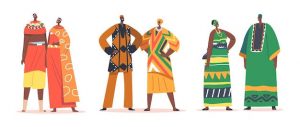Imagine a million people, a vibrant kaleidoscope of colour and movement, with dance and acrobatics, different shades of beauty and elegance, all gathered with a sole purpose of paying homage to a King. This isn’t a scene from a history book, this is the annual Ojude Oba festival in Ijebu-Ode, Nigeria. More than just a celebration, the Ojude Oba is a fascinating case study of how cultural traditions can become economic powerhouses. The Ojude Oba’s root runs deep. It evolved from the Odeda festival, where worshippers of various Yoruba deities showcased their faith through dance and acrobatics. History said that it happened that a prominent chief converted to Islam, giving rise to a new festival, the Ita-Oba, which eventually transformed into the Ojude Oba festival we know today. The heart of the Ojude Oba lies in the Regberegbe, Obafuwaji, Bobagbimo, Bobakeye, Gbobaniyi and Gbobalaye age groups, to name a few. Each group with a distinct fashion that spotlights and projects their unique identities and culture. Think dazzling costumes, intricate dance routines, and a healthy dose of friendly competition. These groups, often led by prominent figures, showcase not just their creativity and fashion prowess but also their commitment to their heritage. The Ojude Oba festival is popularly known as a cultural fashion exhibition of the Yoruba tribe. People are adorned in exquisitely crafted textiles, with the majority made from Aso-Oke, intricate beadwork, and flamboyant headwear, coming together to form arrays of breathtaking display of artistic expression. Tailors, textile producers, and bead-makers all see a surge in business during this period. The festival becomes a platform for local businesses to showcase their skill and talent while contributing to the economic fabric of Ijebuland. The Ojude Oba festival, however isn’t just about the glitz, glamour and the dressings. This year’s theme, “Ojude Oba: Unity and Harmony, Our Gift”, highlights the festival’s role in fostering social cohesion and unity as a tribe. Seeing diverse groups come together, celebrate their shared heritage, and compete in friendly games and activities strengthens the spirit of oneness and community in them. The 2024 Ojude Oba, held in June, went viral, not just for the vibrant displays, but also for the creativity of the photo and videographers. Their captivating storytelling showcased the festival’s essence to a global audience. This social media buzz translates into increased tourism, attracting visitors eager to experience the cultural richness of Ijebu-Ode firsthand. The Ojude Oba festival stands as a testament to the power of cultural traditions. It’s a vibrant tapestry woven from history, fashion, economic opportunity, and social unity. As this festival continues to thrive, it serves as a model for how cultural events can be leveraged to empower communities and promote economic growth. As a Bank with over 130 years of consistent support for the people of Nigeria and their diverse cultural heritage, being woven into the fabrics of the society and promoting financial inclusion across the shores of the country, we are once again reiterating our commitment to helping businesses grow and thrive with an array of products and services. Visit our website today at www.firstbanknigeria.com for more information. #YouFirst #OurCultureOurHeritage #WovenIntotheFabricsofSociety #130YearsofSupportingtheNigerianPeople References https://en.wikipedia.org/wiki/Ojude_Oba_festival https://www.taylorfrancis.com/chapters/edit/10.4324/9780203872659-15/historical-analysis-ojude-oba-festival-ijebu-ode-nigeria-abiodun-akeem-oladiti


